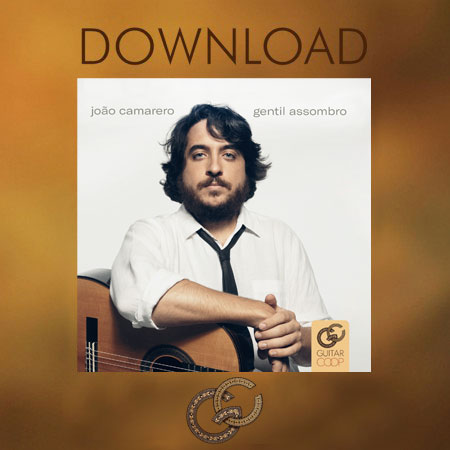Gentle Wonderment is a curious title.First, because it unites two words apparently very distant from one another. “Gentle” makes one think of a hand sliding the air, giving way, “Please! After you. No, I insist!” “Wonderment,” on the other hand, is a reflflex that makes the jaw drop. The title is even stranger, however, than the apparent distance between the terms: in such complicated times, both the generosity of small acts and the state of being astonished seem to have disappeared, undermined by truculence and stupidity. The key word, here, is “seemed”: this beautiful album by João Camarero proves that it has not. Despite everything unfolding in the world right now, hand in hand, gentleness and wonderment can still get off the ground, pick themselves up, and turn everything around.
I heard João Camarero perform for the fifirst time at the end of 2020. To all of you in the future, who may have picked up this CD in a store or have encountered its booklet on the internet, metaverse, or whatever new technological doohickey we may be using to communicate at present, I recall, briefly, what was unfolding. Quarantined at home because of a virus, Brazilians had the impression of watching their country fall apart in real time. Day in and day out, it felt to many of us that it was only a matter of time until the last remaining Villa-Lobos score was burned up along with the Amazon’s final tree. It felt as though all the possibilities of a nation that, despite its many struggles, had produced such luminaries as Pixinguinha, Machado de Assis, Cartola, Ariano Suassuna, Sinhô, Donga, Garoto, João Pernambuco, Guimarães Rosa, and Turíbio Santos had been finally extinguished.
It was then that I heard João Camarero. He picked up his guitar, sat on a stool and straightened his spine like a concert artist. I thought he was going to play some Bach. It was then it began: I realized, moved, that he was playing choro. Brazilian music, that auspicious mixture of Europe and Africa with a hint of Native Brazilian: indebted as much to the Brazilian countryside as to an Orisha like Eshu; a veritable compote of that other Brazil that could have been but wasn’t… yet. I sharpened my ear, raised up my head and heard as the guitar appeared to say: “Friend, as long as we don’t hear the referee’s final whistle or the coming of the last judgment, we can still turn this ship around.” A country capable of producing an album like this cannot be destined to fail.
João’s erect spine is not simply a picturesque detail: his posture says much about his stance as an artist. He understands that popu- lar music is no less rigorous than classical genres. He equally does not fall into the trap, so common in Brazilian instrumentalists, of believing that talent alone can “free one of one’s homework,” as it were, of using sheer virtuosic brilliance to blind the audience of possible mishaps.
Crucial to his education was his departure, still at a very young age, from Avaré – in the interior of the state of São Paulo – to a very diffe- rent country, of radically different customs: the north side of Rio de Janeiro. Once set up in Vila Isabel, he found himself the best teachers (formal and informal) and his talent began to open doors. In almost no time, he was already playing in the so-called “big leagues,” surrounded by instrumentalists who, evidently, saw in him an equal.
With talent and dedication, João Camarero turns down the dial of the fire currently raging in our pathetic, rude, anti-musical, and officialesque Brazil and reaches out towards our gentler traits: intelligence, creativity, inclusivity, talent, and freedom. To hear him makes one’s jaw drop. Mine has already: may yours follow suit.
“Please! I insist! Indeed. I listen to him daily! Thank you.”
Antonio Prata

João’s erect spine is not simply a picturesque detail: his posture says much about his stance as an artist. He understands that popu- lar music is no less rigorous than classical genres. He equally does not fall into the trap, so common in Brazilian instrumentalists, of believing that talent alone can “free one of one’s homework,” as it were, of using sheer virtuosic brilliance to blind the audience of possible mishaps.
Crucial to his education was his departure, still at a very young age, from Avaré – in the interior of the state of São Paulo – to a very diffe- rent country, of radically different customs: the north side of Rio de Janeiro. Once set up in Vila Isabel, he found himself the best teachers (formal and informal) and his talent began to open doors. In almost no time, he was already playing in the so-called “big leagues,” surrounded by instrumentalists who, evidently, saw in him an equal.
With talent and dedication, João Camarero turns down the dial of the fire currently raging in our pathetic, rude, anti-musical, and officialesque Brazil and reaches out towards our gentler traits: intelligence, creativity, inclusivity, talent, and freedom. To hear him makes one’s jaw drop. Mine has already: may yours follow suit.
“Please! I insist! Indeed. I listen to him daily! Thank you.”
Antonio Prata
Musics
1. Um choro breve – Paulinho da Viola
2. Dança brasileira – Radamés Gnattali
3. Homenagem a Arnaldo Neves – Paulinho da Viola
4. Pequenas Valsas Sentimentais #3 – João Camarero
5. Pequenas Valsas Sentimentais #5 – Gentil Assombro – João Camarero
6. Articulado – Sergio Assad
7. Scherzino Mexicano – Manuel Ponce
8. Danza del Corregidor – Manuel de Falla
9. Romance del Pescador – Manuel de Falla
10. Cancion del Fuego Fatuo – Manuel de Falla

Credits – Gentil Assombro
Created by: GuitarCoop
Recorded at: Fazenda Boa Vista
Date: 08 e 09/09/2021
Booklet Texts: Antonio Prata
Translation: David Molina
Recording producer: Ricardo Dias
Editing: João Camarero
Audio Engineer: Ricardo Marui
Mixing/Mastering: Ricardo Marui
Graphic Design: Maikon Nery
Photo: Gil Inoue
Guitar: Sergio Abreu 2020
Strings: Augustine Regal/Blue
Microphones: DPA 2006, Royer SF 24, Neumann KM 184
Converter: Metric Halo LIO-8
Preamp: Millennia HV3-D
Credits – Gentil Assombro
Created by: GuitarCoop
Recorded at: Fazenda Boa Vista
Date: 08 e 09/09/2021
Booklet Texts: Antonio Prata
Translation: David Molina
Recording producer: Ricardo Dias
Editing: João Camarero
Audio Engineer: Ricardo Marui
Mixing/Mastering: Ricardo Marui
Graphic Design: Maikon Nery
Photo: Gil Inoue
Guitar: Sergio Abreu 2020
Strings: Augustine Regal/Blue
Microphones: DPA 2006, Royer SF 24, Neumann KM 184
Converter: Metric Halo LIO-8
Preamp: Millennia HV3-D


 Português
Português



![O violão clássico é uma peça delicada que exige cuidados especiais para manter sua sonoridade e durabilidade. A madeira, o verniz, as cordas e as diversas peças que compõem o instrumento são sensíveis a fatores externos como umidade, temperatura, poeira e até mesmo o suor das mãos.
Entre os cuidados básicos para mantê-lo em ordem estão a limpeza regular, armazenamento adequado, troca de cordas regular, ajustes periódicos e proteção contra impactos.
Com os cuidados certos, o seu violão clássico terá a sonoridade preservada, aumento da vida útil e manterá o valor - que em muitos casos, é inestimável.
Cuidar do seu violão é um ato de amor pela música. Ao dedicar alguns minutos aos cuidados básicos, você estará garantindo que seu instrumento o acompanhe por muitos anos, proporcionando momentos de alegria e inspiração.
[EN] The classical guitar is a delicate instrument that requires special care to maintain its sound quality and longevity. The wood, varnish, strings, and various components are sensitive to external factors such as humidity, temperature, dust, and even hand sweat.
Basic care includes regular cleaning, proper storage, routine string changes, periodic adjustments, and protection from impacts.
With the right care, your classical guitar will retain its sound, last longer, and maintain its value—which, in many cases, is priceless.
Taking care of your guitar is an act of love for music. By dedicating just a few minutes to basic maintenance, you ensure that your instrument stays with you for years to come, bringing joy and inspiration.
#basiccare #classicalguitar #classicalmusic #guitarcoop](https://guitarcoop.com.br/wp-content/plugins/instagram-feed/img/placeholder.png)





